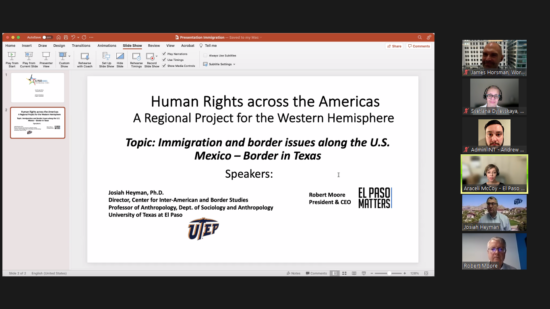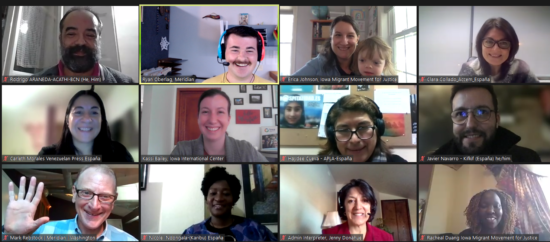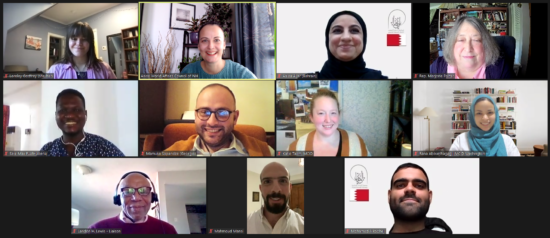Compiled by Margaret Pfeifle, Communications Intern, Global Ties U.S.
This month, Global Ties U.S. asked our Community-Based Members to examine how exchange programs such as the International Visitor Leadership Program (IVLP) impact civic and social justice in their local communities and around the world. Whether organizing IVLP projects on topics such as social change, immigration, or youth engagement, our partners all shared how the exchange resulted in visitors and host communities connecting, learning, and collaborating on new ideas and unique opportunities. Read on to learn more.
Human Rights Across the Americas: A Regional Project for the Western Hemisphere
CBM: El Paso Council for International Visitors
NPA: World Learning

Photo provided by El Paso Council for International Visitors.
In December 2021, the El Paso Council for International Visitors (EPCIV) virtually welcomed the International Visitor Leadership Project (IVLP) titled “Human Rights Across the Americas.” The project’s objectives were to examine U.S. border issues, migration, and voting rights. In the two-day program, the 11 participants explored U.S. foreign policies in the Western Hemisphere that influence the flux of undocumented immigrants and grassroots initiatives that promote the right to vote.
The Western Hemisphere delegation represented Bolivia, Colombia, Costa Rica, Cuba, Dominican Republic, Ecuador, El Salvador, Mexico, Nicaragua, and Venezuela. All participants held important positions in government, education, human rights organizations, and the media.
At the first session, the group met with Robert Moore, CEO and Founder of El Paso Matters, a nonpartisan media organization that uses journalism to expand civic capacity in the region. The group also met with Josiah Heyman, Director of the Center for Interamerican and Border Studies at the University of Texas at El Paso. Both speakers noted that the U.S. must find a long-term immigration solution, and engaged the group in lively discussions on subjects such as the externalization of borders, exploitation, criminalization, procedures, and which programs sponsored by the United States work best in Central America to stop migration. Josiah discussed the dangers immigrants can face, such as victimization by criminals, kidnappers, and rogue law enforcement officials, and explained that migration and transmigration are risky to desperate individuals wishing to find safety in the United States.
Botello Garza, the representative of the Human Rights Commission in Tamaulipas, Mexico, shared how she organizes workshops with the United Nations and the Red Cross to fight xenophobia in her community. All of the speakers admitted that xenophobia is a massive issue at the border because of the fear of foreigners who are not white. The group agreed that it is crucial to actively debate the problem to eradicate negative attitudes against immigrants.
On the second day of the program, Carol Wallace, President of the League of Women Voters of El Paso, discussed initiatives and activities that help increase the participation of minorities in elections. For example, one initiative that the league has implemented is school visits to invite high school seniors to register to vote once they reach the age of 18. She explained that the organization empowers voters and defends democracy, and they rely on activism and advocacy to achieve their mission. Carol also explained that the league does not endorse politicians. This way, they can frequently organize nonpartisan candidate forums in-person and on social media so that community members can understand where candidates stand on different issues.
Next, Jesus Valdez, a board member of the League of Women Voters of El Paso, talked about the U.S. Electoral College and redistricting. He explained how smaller states disproportionally have more electoral votes per person and that the only way to balance the voting power is by amending the Constitution. During this discussion, the visitors explained that, unlike in the United States, the popular vote elects the president in their countries.
Additionally, during this discussion, Icaza Mackliff, a regional delegate from Ecuador, shared that the law requires equal representation of men and women in government bodies in her country, but they experience a lack of women in politics. As a human rights monitor, Icaza’s job is to ensure women’s representation in the municipal government.
The international visitors were grateful to the speakers for the opportunity to examine human rights issues such as avoiding corruption in the political system and encouraging minorities to vote to defend their interests. In addition, the speakers congratulated the visitors for implementing grassroots campaigns to engage citizens in advocating for human rights in their countries.
– Araceli L. McCoy, Executive Director
Human Rights Across the Americas
CBM: World Affairs Council of Kentucky & Southern Indiana, The International Center of Indianapolis
NPA: World Learning
On November 23, the World Affairs Council of Kentucky & Southern Indiana was fortunate to collaborate with fellow Global Ties U.S. Community-Based Member, Leslie Grishin of The International Center of Indianapolis, to co-host a panel discussion on “Human Rights Across the Americas.”
Our panel, hosted in collaboration with Tony Zaun of World Learning, was uniquely centered on LGBT advocacy at the state, local, and national levels. This diverse panel featured five dynamic speakers who hailed from California, Indiana, and Kentucky: Jennifer Pizer, Senior Counsel & Director of Strategic Initiatives of Lamba Legal; Chris Paulsen and Belinda Drake, CEO and Director of Youth Services at Indiana Youth Group; Jeremy McFarland, Office Manager of the Fairness Campaign; and Madison Leach, an attorney and activist. Seventeen international visitors from nine different countries across Latin America participated in the program.
One of the most impactful aspects of the exchange was hearing about the visitors’ advocacy efforts within their home communities. The U.S. speakers also emphasized that many communities across the Americas face similar issues, such as conversion therapy, homelessness of LGBT youth, and fighting for marriage equality. Our voices are strongest when we work together, despite our geographic distance. I am grateful to have had the opportunity to collaborate with and learn from our incredible speakers and visitors on this project. In the words of Martin Luther King, “Injustice anywhere is a threat to justice everywhere.”
– Andi Dahmer, Exchange Program Manager
The Role of U.S. Civil Society in the Integration of Immigrants
CBM: Iowa International Center
NPA: Meridian International Center

Photo provided by Iowa International Center.
The challenges at the intersection of human rights and social inclusion brought together Iowa International Center and Meridian International Center to host six international visitors from Spain on the virtual International Visitor Leadership Program (IVLP) titled “The Role of U.S. Civil Society in the Integration of Immigrants,” in early November 2021.
Joined by U.S. Committee for Refugees and Immigrants Des Moines Office and the Iowa Migrant Movement for Justice, the program prompted open communication between rising leaders fighting for social change on behalf of LGBT+ immigrants, as well as those fighting for refugee legal rights and more accurate media portrayals of immigrants.
Javier Navarro López, a member of the Consultative Council of Kifkif (Association of LGBTIQ+ Migrants and Refugees), noted that the IVLP experience allowed him to better understand the realities of the immigrant experience. “In Spain, there is not much of a history in receiving immigrants,” he said. “The discussion allowed my colleagues and me to make a comparison of the legal and bureaucratic framework that exists between Spain and the United States.” Javier also noted that the group found significant differences that have key consequences for the integration of migrant people.
The six Spanish IVLP participants and their Iowa counterparts engaged in a candid dialogue where they examined policies and agreed that coordination of NGO efforts outside of government serve immigrant populations with additional essential services. Rodrigo Araneda Villasante, a community psychologist and President of ACATHI in Spain, highlighted how the work of a transgender woman developed a shelter strategy to provide housing for other vulnerable transgender immigrants arriving in the United States.
Both Javier and Rodrigo emphasized that comparing Spain and the United States helped them better understand the work of local organizations, and said they were committed to using the IVLP experience to guide them towards a more effective and deeper reach of their shared objectives.
“This group was a perfect example of true discussion and exchange of ideas,” said Kassi Bailey, Iowa International Center’s Director of International Visitors. “During our meeting we heard shared frustration in the challenges, but also shared passion towards helping to welcome immigrants. I think we all left the meeting feeling that we were not alone facing issues and can work together to help build a better world.”
– Lucia Cheng, International Visitor Program Intern
Youth and Civic Engagement
CBM: World Affairs Council of New Hampshire
NPA: MCID Washington

Photo provided by World Affairs Council of New Hampshire.
In November 2021, the World Affairs Council of New Hampshire had the pleasure to virtually host 14 multi-regional visitors for an International Visitor Leadership Project (IVLP) titled “Youth and Civic Engagement” that was administered by MCID Washington. One of the three participating states, the New Hampshire section of their program covered youth political action and volunteering.
This is a strong topic in the state of civic organizations working with the underserved in the community to politically engage youth in a state that considers politics a sport. Our visitors had a chance to meet with Saint Anselm’s College’s Meelia Center for Civic Engagement. The Center works with more than 50 nonprofit organizations in the Manchester community, providing opportunities for students to learn and understand the value of volunteering. Our visitors had an opportunity to meet staff and student leaders to learn their motivation for volunteering and contributing to the community. They all had a passion and commitment, even on off days, to push forward because someone depends on them.
Covering youth political action, visitors had a chance to meet with both the New Hampshire Young Republicans and New Hampshire Young Democrats. In these separate conversations, they learned what the parties’ driving issues were and how each goes about getting their message out to recruit new members.
The highlight of this project was our first meeting, when our delegation met with New Hampshire Legislative Youth Advisory Council. Created in 2006, the Council is a statutory committee of the New Hampshire legislature, and consists of 19 high school and college students who serve as a link between young people and New Hampshire’s government. Appointed from every county in the state, this organization has inspired many youths to challenge laws on-the-books. Visitors met one of their new members, Loreley Godfrey, who, at the age of 17, became one of New Hampshire’s first Eagle Scouts. Loreley was so touched and inspired after meeting the visitors that she has since mobilized her fellow council members to host a virtual social hour with some of the delegates and the youth they work with, opening a window to the world for them to learn from each other. This unique opportunity could never occur without these exchange programs, proving only once again, diplomacy comes at every age!
– Anise Jasman, International Visitor Exchange Program Director
